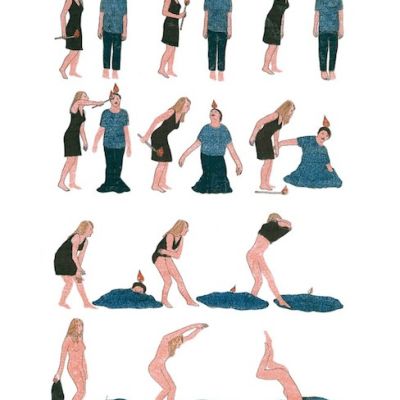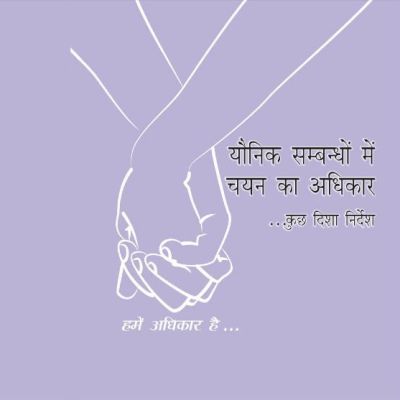Sexuality
Is there a relationship at all that cannot be defined by love? And, if we were to begin talking of relationships other than romantic love, how would we speak of sexuality? Upon this deliberation, we realised that our Love and Sexuality issue seemed to revolve around romantic love and sex. The departure this issue on Relationships and Sexuality makes is to try and incorporate forms of relationships that might not be about romantic love but have their own kind of romance, and facets of sexuality that might not be about sex per se but will place its interest in alternate relationships to it.
आली द्वारा प्रकाशित आली द्वारा 6 राज्यों में (जिसमें उ.प्र., म.प्र., हरियाणा, महाराष्ट्र, पश्चिम बंगाल व केरल शामिल हैं) इस विषय…
They were stranded together on an island, the only two English-speaking writers at a conference (this somehow happens in Berkeley). They have wild and instant intimacy of the kind where you tell each other everything. It’s the kind of friendship in which you want to be together all the time, the world is not enough, the day is not long enough to give you all the time you want with your friend.
My sexual desires may not be what certain people called ‘normal’ and I could not share this with my so called friends as I thought they would consider me weird. Surprisingly a woman in my hometown introduced me to the world of Kink. She was a regular housewife and with her for the first time I got to know what I actually needed and wanted and it went on for a good amount of time till I moved out of that place for many reasons.
True were his words that people will always talk, but why? What was so wrong with us? Was it because he was shorter and I was taller? Or was it because that when we hugged he was more in my embrace than me in his? Or was it that I had to bend a bit to kiss him? Strange how perceptions work about couples – no matter which identity one conforms to.
A multitude of views are recorded when couples are interviewed about their sex lives and relationships. It is often found that while women are more concerned about the way they look and how they react to their partners’ moves (including women’s need to fake orgasms), men worry more about things like performance. It is safe to assume that all of us have sexual insecurities.
So, what can be done about insecurity?
Mainstream media is beginning to pay attention to men’s relationship with abortion – a welcome counterpoint to the anti-woman, anti-abortion rhetoric Men’s Rights Activists (MRAs) spew on the topic.
It could be your best friend, a partner, a sister or a parent. Hurting and getting hurt seem to form the basic universal nature of relationships. I have always wondered about why we like creating these connections, and why we need this social network.
Often when we speak of families and family history, we talk genetics, traditions and inheritance of all kinds. Somehow our relationship by blood or otherwise to a clan is supposed to help us identify our place in the universe. So there’s family medical history, family culture, family traditions of food and career. But sexuality? A family history that focuses on sexuality? What would that even mean?
In the debates around the need to expand the rights that accrue through marriage to same-sex couples, what is often lost are the forms of legal recognition of relationships not in the nature of marriage or blood. As the nature of traditional relationships changes across India, with more people opting to live singly or with friends, we really need to begin thinking seriously about new forms of legal recognition.
What exactly does being ‘comfortable with your sexuality’ mean? From a young age, all children, especially girls, are taught about specific ‘values’, and how we all need to behave in a certain manner or else we’re being ‘inappropriate’. However, I think the term ‘inappropriate’ simply means, “You should be ashamed of your body and should only think about concealing yourself”. And then our teachers and elders and others around us expect us to be automatically comfortable with our sexuality and with how we look, all the while trying to control us and impose their ideas on us.
Not only has evolving discourse on sexuality influenced the fate of how sex work is understood, but also with the growth of sex workers’ rights movements, discourses on sex work are now being able to influence how we think about sexuality. In our issues on Sex Work and Sexuality this month, we hope to be able to traverse some of these convergences.
सम्पादकीय नोट : इस लेख का पहला भाग अप्रैल के पहले संस्करण में प्रकाशित हुआ था सेक्स वर्कर के अधिकारों…
Imtiaz Ali’s 5-minute film begins as any trite gangster flick but rapidly flips things around both in narrative and in audience perception.
Special Court No. 54 is a hall filled with whizzing ceiling fans. When the magistrate enters or exits, people rise to bow. Lawyers in black coats and white pants or saree/suit, sit at a long desk in plastic chairs a level below the magistrate with a clutch of researchers like myself, and anti-trafficking missionaries who “rescue fallen women”.















